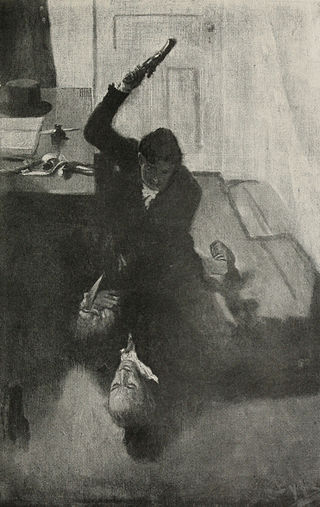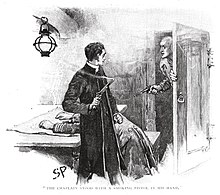Ad hominem, short for argumentum ad hominem, refers to several types of arguments that are fallacious. Typically this term refers to a rhetorical strategy where the speaker attacks the character, motive, or some other attribute of the person making an argument rather than attacking the substance of the argument itself. This avoids genuine debate by creating a personal attack as a diversion often using a totally irrelevant, but often highly charged attribute of the opponent's character or background. The most common form of this fallacy is "A" makes a claim of "fact," to which "B" asserts that "A" has a personal trait, quality or physical attribute that is repugnant thereby going entirely off-topic, and hence "B" concludes that "A" has their "fact" wrong - without ever addressing the point of the debate. Many contemporary politicians routinely use ad hominem attacks, which can be encapsulated to a derogatory nickname for a political opponent.
Prima facie is a Latin expression meaning at first sight or based on first impression. The literal translation would be 'at first face' or 'at first appearance', from the feminine forms of primus ('first') and facies ('face'), both in the ablative case. In modern, colloquial and conversational English, a common translation would be "on the face of it".
Res ipsa loquitur is a doctrine in common law and Roman-Dutch law jurisdictions under which a court can infer negligence from the very nature of an accident or injury in the absence of direct evidence on how any defendant behaved in the context of tort litigation. Although specific criteria differ by jurisdiction, an action typically must satisfy the following elements of negligence: the existence of a duty of care, breach of appropriate standard of care, causation, and injury. In res ipsa loquitur, the existence of the first three elements is inferred from the existence of injury that does not ordinarily occur without negligence.
In a legal dispute, one party has the burden of proof to show that they are correct, while the other party has no such burden and is presumed to be correct. The burden of proof requires a party to produce evidence to establish the truth of facts needed to satisfy all the required legal elements of the dispute.
Circumstantial evidence is evidence that relies on an inference to connect it to a conclusion of fact—such as a fingerprint at the scene of a crime. By contrast, direct evidence supports the truth of an assertion directly—i.e., without need for any additional evidence or inference.
In the United Kingdom, access by the general public to firearms is subject to some of the strictest control measures in the world. Subject to licensing, members of the public may own rifles and shotguns. However, most handguns have been banned in Great Britain since the Dunblane school massacre in 1996. Handguns are permitted in Northern Ireland, the Channel Islands and the Isle of Man which have their own legislation. Scotland imposes an additional licensing regime on airguns, which is not mirrored in England and Wales.
Attempted murder is a crime of attempt in various jurisdictions.

Lemuel Shaw was an American jurist who served as chief justice of the Massachusetts Supreme Judicial Court (1830–1860). Prior to his appointment he also served for several years in the Massachusetts House of Representatives and as a state senator. In 1847, Shaw became the father-in-law of author Herman Melville. He ruled on prominent cases involving slavery, segregation, and religion.
Character evidence is a term used in the law of evidence to describe any testimony or document submitted for the purpose of proving that a person acted in a particular way on a particular occasion based on the character or disposition of that person. In the United States, Federal Rule of Evidence 404 maps out its permissible and prohibited uses in trials. Three factors typically determine the admissibility of character evidence:
- the purpose for which the character evidence is being used
- the form in which the character evidence is offered
- the type of proceeding in which the character evidence is offered
The law of evidence, also known as the rules of evidence, encompasses the rules and legal principles that govern the proof of facts in a legal proceeding. These rules determine what evidence must or must not be considered by the trier of fact in reaching its decision. The trier of fact is a judge in bench trials, or the jury in any cases involving a jury. The law of evidence is also concerned with the quantum (amount), quality, and type of proof needed to prevail in litigation. The rules vary depending upon whether the venue is a criminal court, civil court, or family court, and they vary by jurisdiction.
Carnal knowledge is an archaic or legal euphemism for sexual intercourse. In modern statutes, the term "sexual penetration" is widely used, though with various definitions.
In law, a body of facts that directly supports the truth of an assertion without intervening inference. It is often exemplified by eyewitness testimony, which consists of a witness's description of their reputed direct sensory experience of an alleged act without the presentation of additional facts. By contrast, circumstantial evidence can help prove via inference whether an assertion is true, such as forensics presented by an expert witness.
Dixon v. United States, 548 U.S. 1 (2006), was a United States Supreme Court case concerning the level of proof required to establish the affirmative defense of duress in a federal criminal case.
It is possible to convict someone of murder without the purported victim's body in evidence. However, cases of this type have historically been hard to prove, often forcing the prosecution to rely on circumstantial evidence, and in England there was for centuries a mistaken view that in the absence of a body a killer could not be tried for murder. Developments in forensic science in recent decades have made it more likely that a murder conviction can be obtained even if a body has not been found.

R v Wallace (1931) 23 Cr App R 32 is a leading English criminal case, the first time a conviction for murder was overturned on the ground that the verdict "cannot be supported, having regard to the evidence", as provided for by Section 4(1) of the Criminal Appeal Act 1907. The headnote states: "The Court will quash a conviction founded on mere suspicion".
There are several non-standard accounts of Robert F. Kennedy's assassination, which took place shortly after midnight on June 5, 1968, in Los Angeles, California. Kennedy was assassinated at the Ambassador Hotel, during celebrations following his successful campaign in California's primary elections as a leading 1968 Democratic presidential candidate; he died the following day at Good Samaritan Hospital.
In India according to Section 300 of the Indian Penal Code, 1860, murder is defined as follows:
Murder.--Except in the cases hereinafter excepted, culpable homicide is murder, if the act by which the death is caused is done with the intention of causing death, or- 167 2ndly.-If it is done with the intention of causing such bodily injury as the offender knows to be likely to cause the death of the person to whom the harm is caused. or- 3rdly.-If it is done with the intention of causing bodily injury to any person and the bodily injury intended to be inflicted is sufficient in the ordinary course of nature to cause death, or- 4thly.-If the person committing the act knows that it is so imminently dangerous that it must, in all probability, cause death, or such bodily injury as is likely to cause death, and commits such act without any excuse for incurring the risk of causing death or such injury as aforesaid.

Criminal law is a system of laws that is connected with crimes and punishments of an individual who commits crimes. In comparison, civil law is where the case argues their issues with one entity to another entity with support of the law. Crimes can vary in definition by jurisdiction but the basis for a crime are fairly consistent regardless.

Pistol-whipping or buffaloing is the act of using a handgun as a blunt weapon, wielding it as an improvised club. Such a practice dates to the time of muzzle loaders, which were brandished in such fashion in close-quarters combat once the weapon's single projectile had been expended.

The Public Safety and Recreational Firearms Use Protection Act, popularly known as the Federal Assault Weapons Ban, was a subsection of the Violent Crime Control and Law Enforcement Act of 1994, a United States federal law which included a prohibition on the manufacture for civilian use of certain semi-automatic firearms that were defined as assault weapons as well as certain ammunition magazines that were defined as large capacity.





